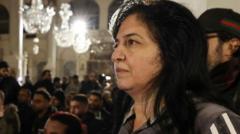Protests erupted in Syria after masked gunmen set fire to a Christmas tree in Suqaylabiyah, a town predominantly inhabited by Christians located near Hama. The arson incident, filmed and shared on social media, triggered widespread outrage and demonstrations throughout the country.
The group leading the protest, Hayat Tahrir al-Sham (HTS), claimed that the arsonists were foreign fighters and assured the public that the tree would be repaired promptly. Demonstrators took to the streets, voicing demands for the newly established Islamist government to safeguard the rights of religious minorities. In the capital's Bab Touma neighborhood, protesters were seen carrying a cross and Syrian flags, chanting, "we will sacrifice our souls for our cross." One demonstrator, Georges, expressed concern over the religious climate in the country, stating, "If we're not allowed to live our Christian faith in our country, as we used to, then we don't belong here anymore."
Syria is home to a tapestry of ethnic and religious groups, including Kurds, Armenians, Christians, and various Muslim sects, contributing to a complex sociopolitical landscape. The recent fall of President Bashar al-Assad's regime to rebel forces, ending more than five decades of his family's rule, has added to the uncertainty regarding the future governance of the nation.
While HTS has a history marked by radical jihadist ideologies, the group now claims to distance itself from this past and aims to foster an inclusive governance model for all communities in Syria. As evidence of potential diplomatic shifts emerges, including the U.S. recently withdrawing a $10 million bounty on HTS leader Ahmed al-Sharaa, some question whether the group can be trusted to uphold the rights and freedoms of religious minorities.
Syria’s challenging landscape is further complicated by foreign fighters and Islamist extremist ideologies, such as those represented by ISIS, posing a significant hurdle for the new leadership. As the nation seeks stability, the fate of religious minorities remains precarious amid ongoing unrest.



















